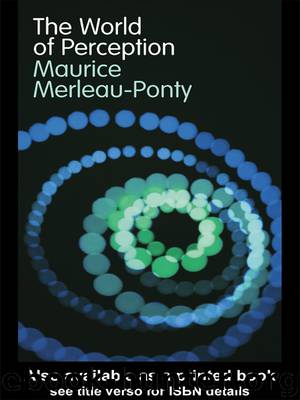The World of Perception by Merleau-Ponty Maurice;

Author:Merleau-Ponty, Maurice;
Language: eng
Format: epub
Publisher: Routledge
Published: 2011-01-31T16:00:00+00:00
LECTURE 3
Exploring the World of Perception: Sensory Objects
Let us turn now from our examination of space to the objects which fill that space. If we consult a classical psychology textbook, it will tell us that an object is a system of properties which present themselves to our various senses and which are united by an act of intellectual synthesis. For example, this lemon is a bulging oval shape with two ends plus this yellow colour plus this fresh feel plus this acidic taste … This analysis, however, is far from satisfactory: it is not clear how each of these qualities or properties is bound to the others and yet it seems to us that the lemon is a unified entity of which all these various qualities are merely different manifestations.
The unity of the object will remain a mystery for as long as we think of its various qualities (its colour and taste, for example) as just so many data belonging to the entirely distinct worlds of sight, smell, touch and so on. Yet modern psychology, following Goethe’s lead, has observed that, rather than being absolutely separate, each of these qualities has an affective meaning which establishes a correspondence between it and the qualities associated with the other senses. For example, anyone who has had to choose carpets for a flat will know that a particular mood emanates from each colour, making it sad or happy, depressing or fortifying. Because the same is true of sounds and tactile data, it may be said that each colour is the equivalent of a particular sound or temperature. This is why some blind people manage to picture a colour when it is described, by way of an analogy with, for example, a sound. Provided that we restore a particular quality to its place in human experience, the place which gives it a certain emotional meaning, we can begin to understand its relationship to other qualities which have nothing in common with it. Indeed our experience contains numerous qualities that would be almost devoid of meaning if considered separately from the reactions they provoke in our bodies. This is the case with the quality of being honeyed. Honey is a slow-moving liquid; while it undoubtedly has a certain consistency and allows itself to be grasped, it soon creeps slyly from the fingers and returns to where it started from. It comes apart as soon as it has been given a particular shape and, what is more, it reverses the roles by grasping the hands of whoever would take hold of it. The living, exploring, hand which thought it could master this thing instead discovers that it is embroiled in a sticky external object. Sartre, who must take the credit for this elegant analysis, writes:
Download
This site does not store any files on its server. We only index and link to content provided by other sites. Please contact the content providers to delete copyright contents if any and email us, we'll remove relevant links or contents immediately.
The remains of the day by Kazuo Ishiguro(7551)
Tools of Titans by Timothy Ferriss(6949)
The Black Swan by Nassim Nicholas Taleb(6192)
Inner Engineering: A Yogi's Guide to Joy by Sadhguru(5897)
Giovanni's Room by James Baldwin(5878)
The Way of Zen by Alan W. Watts(5800)
The Six Wives Of Henry VIII (WOMEN IN HISTORY) by Fraser Antonia(4791)
The Power of Now: A Guide to Spiritual Enlightenment by Eckhart Tolle(4755)
Astrophysics for People in a Hurry by Neil DeGrasse Tyson(4620)
Asking the Right Questions: A Guide to Critical Thinking by M. Neil Browne & Stuart M. Keeley(4576)
12 Rules for Life by Jordan B. Peterson(3734)
The Ethical Slut by Janet W. Hardy(3503)
Skin in the Game by Nassim Nicholas Taleb(3462)
Housekeeping by Marilynne Robinson(3401)
The Art of Happiness by The Dalai Lama(3384)
Double Down (Diary of a Wimpy Kid Book 11) by Jeff Kinney(3273)
Skin in the Game: Hidden Asymmetries in Daily Life by Nassim Nicholas Taleb(3264)
Walking by Henry David Thoreau(3234)
12 Rules for Life: An Antidote to Chaos by Jordan B. Peterson(3203)
